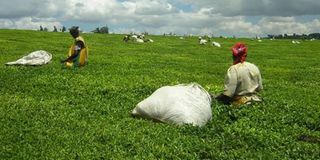Tea workers renew fight against harvesting machines

Tea pickers working at a plantation in Nandi County.
Tea workers have revived their push for mechanised tea harvesting to be abolished, citing massive job losses and claims that the quality of Kenyan tea has been compromised on the international market.
They appealed to President William Ruto to direct multinational tea companies to stop importing and using harvesting machines, in keeping with his bottom-up economic plans that he promised on the campaign trail.
They claim thousands have lost jobs in the tea sector since the machines were introduced, urging the President to protect jobs.
More than 70,000 tea pickers have lost their jobs in the last 10 years, with companies citing high operational costs, says the Kenya Plantation and Agriculture Workers Union (KPAWU).
Business dynamics
Tea workers say one tea machine can do the work of 2,000 people a day, while Kenya Tea Growers Association CEO Apolo Kiarie explains that tea companies had to seek ways of remaining in business and mechanical tea picking was one of them.
KPAWU leaders argue that for the economy to grow, the large number of tea workers that companies replaced with tea machines must be reinstated.
Also read: Tea picking machines remain a sticky issue in Rift Valley politics
Many tea workers struggle to make ends meet, and the harvesting machines have not made it any easier, said KPAWU national chairman Eliakim Ochieng.
The workers reminded Dr Ruto about his election campaign promises, saying he and his Kenya Kwanza brigade pledged to address the issues of tea companies.
“As tea workers, we are asking President Ruto’s government to ban the use of harvesting machines by tea companies to protect millions of families in Kenya and those that directly or indirectly rely on the tea industry for survival,” he said.
Catch-22
The workers’ demands put the President in a catch-22 situation – he has to balance the expectations to protect local jobs and the need to keep investors in the tea industry happy.
During the election campaigns, Agriculture Cabinet Secretary Peter Munya also promised to ban tea companies from importing tea machines, accusing them of creating an unemployment crisis in Kenya and citing the need to maintain the quality of Kenyan tea.
Mr Ochieng, the KPAWU chairman, claimed the machines had compromised the quality of Kenyan tea.
The workers said tea picking should be done with human hands to maintain quality.
“Other presidents from eastern Africa have banned tea machines and given priority to the employment of their own people,” he said.
Some of the multinational tea companies in Kenya are Eastern Produce Kenya (EPK), Williamson, James Finely and Nandi Tea.





